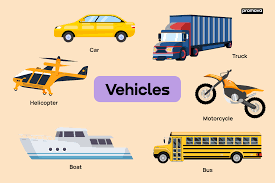The Evolution of Vehicles: From Horse-Drawn Carriages to Modern Automobiles
Throughout history, the concept of transportation has evolved significantly, with vehicles playing a crucial role in shaping the way we move from one place to another. From the humble beginnings of horse-drawn carriages to the sleek and efficient automobiles of today, the evolution of vehicles has been a fascinating journey marked by innovation and technological advancements.
The Early Days: Horse-Drawn Carriages
In ancient times, horse-drawn carriages were the primary mode of transportation for both goods and people. These carriages, often made of wood and pulled by horses, provided a means of travel for the wealthy and elite. Over time, different variations of carriages emerged, each serving specific purposes such as carrying goods, passengers, or even serving as mobile homes for nomadic tribes.
The Industrial Revolution: Steam-Powered Vehicles
The Industrial Revolution brought about significant changes in transportation with the introduction of steam-powered vehicles. Steam engines replaced horses as the primary source of power for trains and early automobiles. These vehicles revolutionized travel by making it faster and more efficient than ever before.
The Age of Automobiles: Internal Combustion Engine
With the invention of the internal combustion engine in the late 19th century, automobiles as we know them today began to take shape. The mass production of cars by companies like Ford made them more accessible to the general public, leading to a boom in personal transportation. Cars became symbols of freedom and independence, allowing people to travel long distances with ease.
Modern Innovations: Electric and Autonomous Vehicles
In recent years, there has been a shift towards more sustainable forms of transportation with the rise of electric vehicles (EVs). These cars run on electricity instead of gasoline, reducing emissions and dependence on fossil fuels. Additionally, advancements in technology have paved the way for autonomous vehicles that can drive themselves using artificial intelligence and sensors.
The Future: Towards Sustainable Mobility
As we look towards the future, it is clear that sustainable mobility will play a crucial role in shaping the vehicles of tomorrow. Innovations such as hydrogen fuel cells, renewable energy sources, and smart infrastructure are paving the way for a greener and more efficient transportation system. The evolution of vehicles continues to unfold, promising exciting possibilities for how we move around in our ever-changing world.
Top 7 Essential Questions Answered for Your Vehicle: Fuel Efficiency, Safety, Maintenance Costs, Warranty, Tech Features, Towing Capacity, and Eco-Friendly Options
- What is the fuel efficiency of this vehicle?
- What safety features does this vehicle have?
- How much does it cost to maintain this vehicle?
- What is the warranty coverage for this vehicle?
- Does this vehicle have advanced technology features such as navigation and connectivity?
- What is the towing capacity of this vehicle?
- Is there a hybrid or electric version available for this vehicle?
What is the fuel efficiency of this vehicle?
When considering a vehicle, one commonly asked question is, “What is the fuel efficiency of this vehicle?” Fuel efficiency refers to the amount of fuel a vehicle consumes to travel a certain distance, typically measured in miles per gallon (MPG) for gasoline-powered vehicles. Understanding the fuel efficiency of a vehicle is important as it directly impacts operating costs and environmental impact. Vehicles with higher fuel efficiency require less fuel to cover the same distance, resulting in cost savings and reduced carbon emissions. Manufacturers often provide official fuel efficiency ratings based on standardized testing procedures to help consumers make informed decisions when choosing a vehicle that aligns with their priorities and needs.
What safety features does this vehicle have?
When considering a vehicle, one common question that arises is, “What safety features does this vehicle have?” Safety features in a vehicle are crucial for providing protection and peace of mind to drivers and passengers. These features may include advanced airbag systems, anti-lock braking systems (ABS), electronic stability control (ESC), adaptive cruise control, lane departure warning systems, blind-spot monitoring, and rearview cameras. By understanding the safety features of a vehicle, individuals can make informed decisions to ensure their safety on the road.
How much does it cost to maintain this vehicle?
One of the most common questions regarding vehicles is, “How much does it cost to maintain this vehicle?” The answer to this question varies depending on several factors, such as the make and model of the vehicle, its age, mileage, and overall condition. Maintenance costs typically include routine services like oil changes, tire rotations, brake inspections, and fluid replacements. Additionally, unexpected repairs or part replacements may arise over time. It’s essential for vehicle owners to budget for regular maintenance to ensure the longevity and performance of their vehicles while being prepared for any unforeseen expenses that may arise.
What is the warranty coverage for this vehicle?
When inquiring about warranty coverage for a vehicle, it is essential to understand the terms and conditions outlined by the manufacturer or dealership. Warranty coverage typically includes protection against defects in materials or workmanship for a specific period or mileage limit. It is important to inquire about what components are covered under the warranty, the duration of coverage, and any exclusions that may apply. Understanding the warranty coverage for a vehicle ensures peace of mind and clarity regarding potential repairs or replacements that may be needed during the specified warranty period.
Does this vehicle have advanced technology features such as navigation and connectivity?
Prospective buyers often inquire about the availability of advanced technology features like navigation and connectivity in vehicles. These features have become increasingly sought after as they enhance the overall driving experience and convenience for modern drivers. Navigation systems provide real-time directions and help drivers navigate unfamiliar roads with ease, while connectivity features such as Bluetooth, smartphone integration, and Wi-Fi enable seamless communication and entertainment on the go. The presence of these advanced technology features has become a key consideration for many consumers when evaluating a vehicle’s appeal and functionality.
What is the towing capacity of this vehicle?
When inquiring about a vehicle’s towing capacity, it refers to the maximum weight that the vehicle can safely tow behind it. This specification is crucial for those who plan to haul trailers, boats, or other heavy loads. Understanding the towing capacity of a vehicle ensures that you do not exceed its limits, which can lead to safety hazards and potential damage to both the vehicle and whatever is being towed. It is always recommended to consult the manufacturer’s guidelines or speak with a knowledgeable professional to determine the appropriate towing capacity for your specific needs.
Is there a hybrid or electric version available for this vehicle?
Customers often inquire about the availability of a hybrid or electric version for this vehicle. As the demand for more environmentally friendly transportation options continues to grow, many are interested in vehicles that offer improved fuel efficiency and reduced emissions. Manufacturers have been responding to this trend by introducing hybrid and electric models across various vehicle categories, providing consumers with eco-friendly alternatives that align with their sustainability goals.



